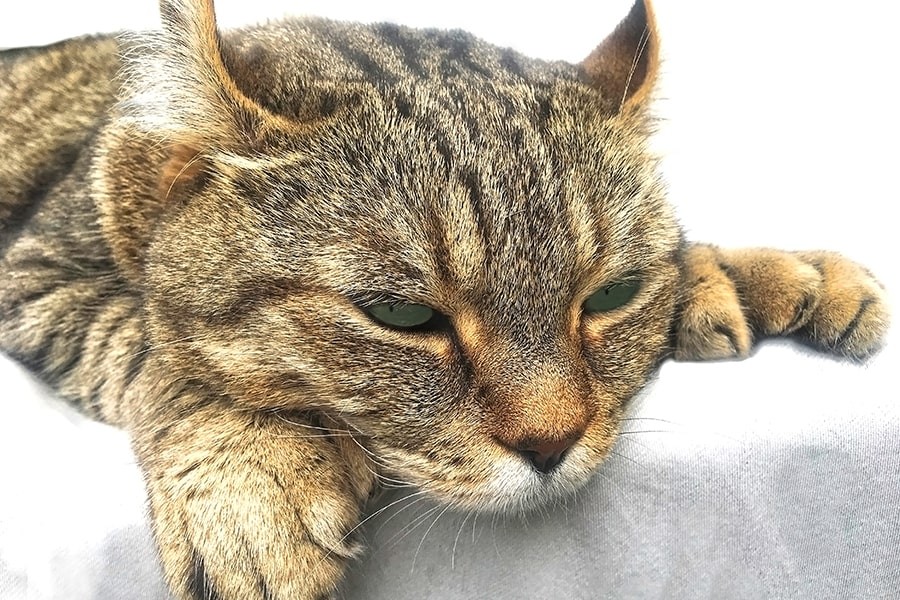Alt text: Adorable highland lynx kitten playfully lying on its back on a soft white blanket, showcasing its domestic pet potential.
Are you captivated by the striking appearance of wild lynx but desire a friendly, domestic feline companion? The Highland Lynx cat, with its bobbed tail, curled ears, and spotted coat, might just be the perfect pet for you. Despite their name and wildcat resemblance, Highland Lynx cats are entirely domestic breeds known for their affectionate and playful personalities. If you’re wondering “Are Lynx Cats Good Pets?”, this comprehensive guide will explore everything you need to know about Highland Lynx cats to help you decide if one of these unique felines is the right addition to your family.
What is a Highland Lynx Cat?
Despite their name suggesting a wild heritage, Highland Lynx cats are a relatively new breed developed from domestic cats. Originating in 1993, cat breeder Joe Childers intentionally set out to create a domestic cat breed that possessed the striking look of wild cats, but with a gentle and amiable temperament suitable for home life. The Highland Lynx was achieved by crossing the Desert Lynx and Jungle Curl breeds. This deliberate breeding resulted in cats with distinctive physical traits, including a bobbed or short tail, unique curled-back ears, and coats often marked with spots or bullseye patterns.
To dispel any misconceptions about wild cat ancestry, the breed’s name evolved to Highlander or Highlander Shorthair, further emphasizing their domestic nature. These names better reflect their lineage as a mix of domestic breeds carefully selected for specific traits, rather than any connection to wild lynx populations.
Temperament and Personality: Why Highland Lynx Make Great Companions
When considering “are lynx cats good pets?”, temperament is a crucial factor. The Highland Lynx personality is a standout trait, making them a popular choice for families and individuals alike. They are renowned for their kind and gentle demeanor, thriving on interaction and companionship. This affectionate nature allows them to integrate seamlessly into households of any size, bringing warmth and playfulness to their environments.
Highland Lynx cats are particularly known for their compatibility with children of all ages. Their patient and tolerant nature makes them excellent family pets. However, it’s always important to supervise interactions between children and cats, regardless of breed. Teaching children how to respectfully interact with pets, avoiding tail or ear pulling and ensuring gentle handling, is essential for a harmonious relationship.
These social felines also generally enjoy the company of other animals, including cats and even dogs, making them adaptable to multi-pet households. Proper introductions and supervision are key when integrating a Highland Lynx with existing pets. While most are accepting of new companions, individual personalities vary, and some may require a longer adjustment period to become comfortable with other four-legged family members. Patience and gradual introduction are crucial for ensuring a peaceful and positive environment for all your pets.
Beyond their affectionate nature, Highland Lynx cats are known for their high energy levels and playful spirits. They require daily exercise and ample opportunities to engage in active play. Providing them with a variety of toys, such as interactive puzzles, chasing toys, and climbing structures like cat trees, is vital for keeping them physically and mentally stimulated. Their intelligence shines through in their love for puzzle toys and brain games, which not only help burn off energy but also prevent boredom and encourage mental agility. A stimulating environment filled with opportunities for play is key to a happy and well-adjusted Highland Lynx pet.
 highland lynx tabby cat trying to take a nap
highland lynx tabby cat trying to take a nap
Caring for Your Highland Lynx Cat: Grooming, Exercise, and Health
Understanding the grooming, exercise, and health needs of a Highland Lynx is essential when considering “are lynx cats good pets?”. Fortunately, they are generally low-maintenance in terms of grooming. Their short coat typically requires only weekly brushing to remove loose hair and keep their coat healthy and shiny. However, if your Highland Lynx has a longer coat variant, more frequent brushing, perhaps daily, may be necessary to prevent matting and reduce hairballs.
Dental care is a crucial aspect of overall pet health. Regular teeth brushing, ideally a few times a week, is recommended for Highland Lynx cats. Using cat-specific toothpaste and a soft toothbrush, establish this routine early in their life to help prevent dental disease and maintain their oral hygiene.
Ear care is another important part of their grooming regime. Regularly check their distinctive curled ears for any signs of redness, discharge, or odor, which could indicate an ear infection. If any of these symptoms are present, a veterinary visit is necessary. To maintain ear cleanliness and prevent infections, gently clean their outer ears with a cotton ball and a cat-safe ear cleaning solution. Avoid using cotton swabs or probing into the inner ear, as this can cause injury.
Nail trimming should be performed regularly, typically every few weeks to a month, depending on the individual cat’s nail growth. Providing scratching posts can help naturally wear down their nails between trims. While some cats are not fond of paw handling, positive reinforcement with treats and patience can make nail trimming a more manageable process. If you are uncomfortable trimming your cat’s nails yourself, many veterinarians and groomers offer this service.
While Highland Lynx cats are considered a relatively healthy breed, like all cats, they can be prone to certain health issues. Being a mix of Desert Lynx and Jungle Curl breeds, they may inherit predispositions from their parent breeds. According to claims data, common health concerns in Highland Lynx cats include ear infections, Horner’s syndrome (a neurological disorder affecting the eyes and facial muscles), hematuria (blood in the urine), constipation, and urinary tract infections.
Annual veterinary check-ups are vital for preventative care and early detection of any health issues. Even if your Highland Lynx appears healthy, these routine examinations are essential for maintaining their well-being. Prompt veterinary attention is crucial if you notice any changes in your cat’s behavior or health. Being informed about potential health issues and proactive in preventative care will contribute to a long and healthy life for your Highland Lynx companion.
Fun and Engaging: Living with a Highland Lynx
Adding to the question “are lynx cats good pets?”, Highland Lynx cats possess several fun and endearing traits that enhance their appeal as companions. Contrary to the typical cat stereotype of disliking water, Highland Lynx cats often exhibit a fascination with and enjoyment of water. Some may even seek out opportunities to play in water, adding a unique and entertaining dimension to their behavior.
Another distinctive feature found in some Highland Lynx cats is polydactylism, meaning they are born with more than the usual number of toes on their paws. This genetic variation can add to their unique charm and does not typically cause any health issues.
Furthermore, Highland Lynx cats are known for their intelligence and trainability. They can be taught various tricks and commands, and some even enjoy playing fetch, blurring the lines between typical feline and canine behaviors. Their eagerness to learn and engage in interactive play makes training sessions a fun and bonding experience for both cat and owner.
These fun facts highlight the engaging and quirky nature of Highland Lynx cats, reinforcing their suitability as entertaining and interactive pets. Their unique behaviors and trainability contribute to a dynamic and rewarding pet ownership experience.
Choosing the Right Name for Your Lynx-Like Companion
Selecting a name for your Highland Lynx cat is a personal and enjoyable part of welcoming them into your home. Given their striking appearance and lynx-like features, you might consider names that reflect their wild beauty or their affectionate domestic nature. Literary-inspired names can also be a meaningful choice. Some name suggestions include Ichabod, Argos, Finn, Darcy, Scarlett, Bilbo, Princess Buttercup, Percy, Atticus, and Cosette. Ultimately, the best name is one that you love and that suits your Highland Lynx cat’s personality and appearance.
Conclusion: Are Highland Lynx Cats the Right Pet for You?
So, “are lynx cats good pets?” Specifically, Highland Lynx cats are indeed excellent pets for the right individuals or families. They combine the captivating appearance of a wild cat with the loving and adaptable temperament of a domestic breed. Their affectionate nature, compatibility with children and other pets, and playful energy make them wonderful companions.
However, like all pets, they require commitment and care. Their high energy levels necessitate daily exercise and mental stimulation. While grooming is relatively low-maintenance, consistent dental and ear care are essential. Prospective owners should also be aware of potential health issues and commit to regular veterinary care.
If you are seeking an intelligent, playful, and affectionate feline companion with a striking and unique appearance, and are prepared to meet their needs for activity and care, then a Highland Lynx cat could be the perfect pet for you. Their engaging personality and distinctive traits make them a rewarding and delightful addition to any loving home.
